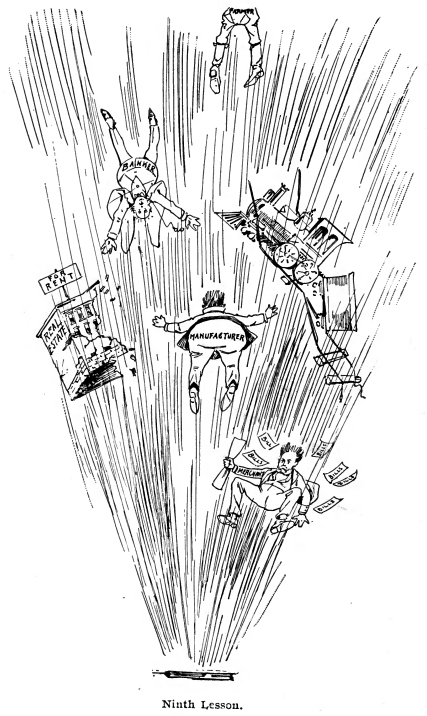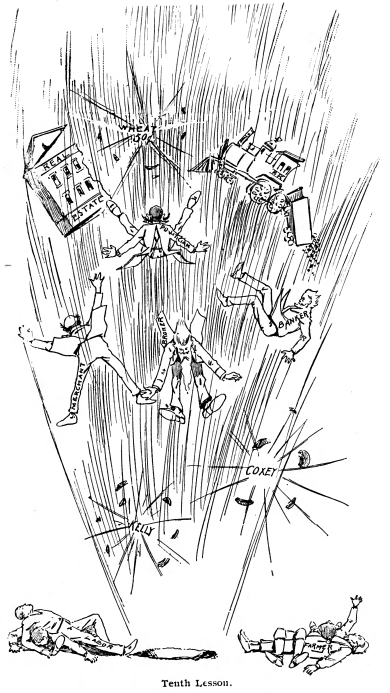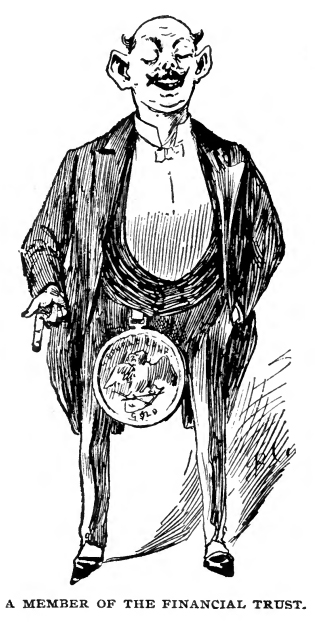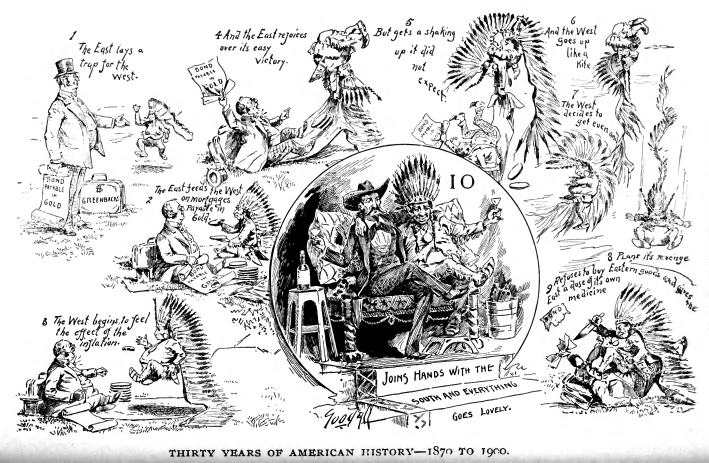Matrix Files
Where You Have Taken The Red Pill
Coin's Financial Course - Chapter III - THE THIRD DAY.
« Chapter II PDF File found here Chapter IV »
CHAPTER III.
An increased interest was plainly seen in the large attendance on the third day. COIN was also received with marked favor, and groups gathered around him as he entered the hall and warmly shook his hand.
He was assured that Chicago had many bimetallists, but that the subject had been a perplexing one to the people. It was regarded as an abstruse question, and the people generally had not tried to unravel it. It required the knowledge of so many statistics and facts with which the masses were not familiar, they were hardly expected to understand it.
Mr. Joel Bigelow, of 2449 Prairie avenue, was one of the most demonstrative in a cordial greeting to the little financier.
"Give it to them, young man," said Mr. Bigelow. "The eyes of the people here have been blinded with this gold craze. I have been distributing Archbishop Walsh's pamphlet among them and have opened some of their eyes."
Mr. Bigelow is an exception to most bimetallists. He had not been forced by personal business disaster to inquire into the cause of so many failures. He is a large real estate owner, owes no debts and has plenty laid by. He is philanthropic. He believes in the happiness of the people. Would that there were more such men!
With a pleasant salutation to all, COIN moved along through the crowd until he reached the stage, and promptly at 10 o'clock began his lecture of the third day.
"The science of money," he began, "is an exact science. As much so as mathematics.
"The primary value of all property is its exchange value. If we had no money, one kind of property would be exchanged for another. Needing the calico on the merchant's shelf, you would exchange for it a bushel of potatoes or such property as you might have to offer. A sort of exchange value would be placed on all property. A bushel of wheat would buy about so many pounds of sugar, and so on.
"This is what is meant by the exchange value of property. Money is a medium of exchange to facilitate this exchanging of property.
"If there were no money, and we had to depend on exchanging property for property, we could find a subsistence, but there would be no such thing as our present civilization or anything like it.
"Each merchant would have to be prepared to store all kinds of property, perishable and otherwise, he received in exchange for his goods. Rail roads would have to arrange to receive payment for fares and freight in property and store it until it again could be exchanged.
"If you went to the theatre you would have to take with you a crate of cabbage or some other kind of property to pay your way into the play-house.
"There would be no practical method for paying labor. Commerce would virtually cease, and civilization would go backward.
"If to be without money would produce such a result, then the subject assumes vast importance.
"As stagnation and depression to business incalculable would result from having no money, then a part of these evils can be brought about by having money insufficient in either quality or quantity.
"In the first place, it was deemed best to select something for money which was valuable within itself. Something that had an exchange value. So that he who parted with his property for it, had something which was itself valuable.
"By stamping it as money, and making it legal tender in the payment of all debts, it then became money, and possessed two qualities:
"First; It had value of itself. If the government went to pieces that had stamped it, it was still valuable property and would have an exchange value.
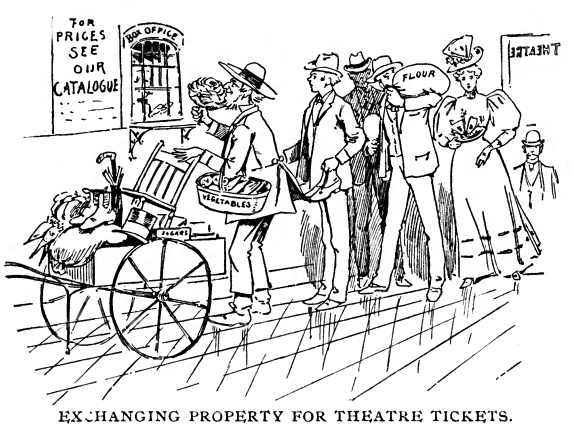
"Secondly; When made money, it became a common medium of exchange and took the place of barter and trade. The stamp of the government upon it, became a certificate of its quality and quantity. Thus by making a commodity into money we had a medium of exchange that was both useful and valuable.
SILVER AND GOLD ADOPTED.
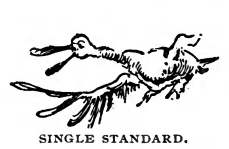
"After using many perishable commodities, experience and wisdom brought the people of the world to the use of silver and gold.
"If experience could suggest a commodity better adapted for money than metallic money made from silver and gold, it should be adopted.
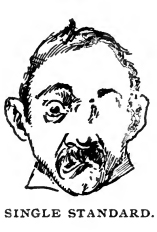
"The merit of these two metals is that neither will rust, corrode nor stain, and both are odorless. As compared with other property, both are very durable. Of the two, silver is the most durable. Abrasion causes more loss to gold than to silver, and the latter may be carried in the pocket and subjected to great use with but little loss. One was the money of the people the other, of the rich. As two legs are necessary to walk and two eyes to see, so were these two monies necessary to the prosperity of the people.
"It was considered that silver and gold were sufficient in quantity for use as primary money, but if at any time their combined quantity should become too small, then some other metal would have to be adopted and added to these two. The law of unlimited demand by free coinage, would tie a third metal to these two, and thus increase the quantity, if at any time it became necessary.
"Thus the founders of a monetary system, on the principle of free coinage to the commodity selected, had a practical method for supplying any deficiency that might arise by reason of the exhaustion of the silver and gold mines."
AN INTERRUPTION
Thus far everyone had listened attentively, and no one had interrupted the little speaker. Now Mr. John R. Walsh, president of the Chicago National Bank and prinicipal owner of The Chicago Herald and Evening Post, who occupied a seat near the front, arose and asked this question: " How can the government by passing a law add a cent to the commercial value of any commodity?" "You were not here yesterday?" said COIN to Mr. Walsh. To this Mr. Walsh replied that he was not.
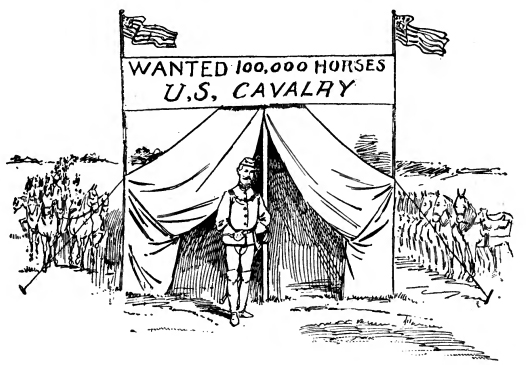
"Suppose," said COIN, "that Congress should pass a law tomorrow authorizing the purchase by the government of 100,000 cavalry horses of certain sizes and qualities. And the government entered the market to get these horses. Horses would advance in value. Not only the kind of horses desired, but also other horses upon which there would be a demand to take the place of the horses sold to the government."
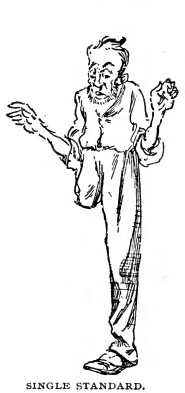
The hand-clapping that followed this reply, and smiles on many faces, indicated two things - one was, that the reply was satisfactory; the other, that the school was making progress - for it was the first applause COIN had received.
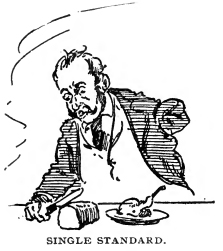
"The government" continued COIN, "can create a demand for a commodity."
"The prospect of a law being passed will sometimes add to the value of property. The tariff law was recently being considered by the Finance Committee of the Senate, and on its becoming known that the committee would report in favor of a high tariff on sugar, the market value of the stock of the American Sugar Refining Company advanced 15 per cent. Its total stock is eighty million dollars. This prospect of a law passing added twelve millions of dollars to the wealth of the stockholders of that company. If Mr. Walsh will read the proceedings of yesterday's school, he will see how free coinage fixes the commercial value of silver.
"In the free coinage of silver as money, the effect is not to increase its exchange value, but to give a permanent and fixed value."
MONEY AS A SCIENCE
"We are now dealing with money as a science, and, strictly speaking, nothing is money except that commodity which has been selected to be money. It is a common thing for us to refer to National Bank notes, greenbacks and other forms of paper money as money."
"After a nation has fixed what its money shall be, it then issues different forms of credit money all of which are directly or indirectly redeemable in the commodity to which a fixed and stable value has been given.
"This is done for convenience, and to facilitate commerce and the exchange of property. It does not add one dollar to your actual money but represents your real money, and being easier to carry, is a convenience.
"All money may be a medium of exchange, but primary money only is the measure of values. Credit money is not a measure of values; it is a medium of exchange only.
"I will refer to money proper as redemption or primary money, and in speaking generally of all other forms of money, will use the term credit money.
"There are two kinds of credit money, as to the material out of which they are made. One is made on paper and embraces all forms of government and bank notes that are issued from time to time as authorized by law. The other is - token money.
"Token money is made from some metal that does not enjoy free coinage.
"Credit money of all kinds circulates by reason of its being redeemable directly or indirectly in money - in redemption money, property money. A piece of paper money, or token money, is a promise of the government to pay so much money. The money promised is the redemption money.
"With so much paper or credit money in your possession, there is supposed to be that much redemption money to your credit with the government or bank issuing it. It is a check to bearer for money, when presented.
"Hence it is called credit money. It circulates on the credit of the government, on the confidence of the people that the government will be able to redeem it if it is presented.
"I have taken pains to impress on you the distinction between actual money and credit money, as no just comprehension of our monetary system as a science can be had without it.
"Actual money was too cumbersome to handle in all the transactions of business, and this gave rise to issuing credit money representing it. Like wheat in your wheat elevators certificates are issued to those who put their wheat there. Such certificates are traded in. Each time one of them is transferred, it is equivalent to transferring the wheat itself. Wheat is behind the certificates. A man does not carry a brick house around in his pocket, but he can carry the deed to it.
"When you have credit money in your pocket, you are carrying around with you the title to property of that commercial value.
"In issuing dollar for dollar of credit money to redemption money, it is not necessary that the government should keep the latter at all times in its treasury in full amount ready to redeem all the credit money.
"Experience teaches that so long as sufficient redemption money is in the country, the credit of the government can be depended upon to get it. But it cannot strain the proportion beyond such amount without making the danger imminent, and the lack of confidence great.
"If there is one thousand million dollars of redemption money in the United States in its treasury, its banks, and among its people then one thousand million of credit money can be safely used and not more.
"If you want to increase the currency, you must in safety do it by adding to the redemption money, and for each dollar so added one dollar of credit money may be added.
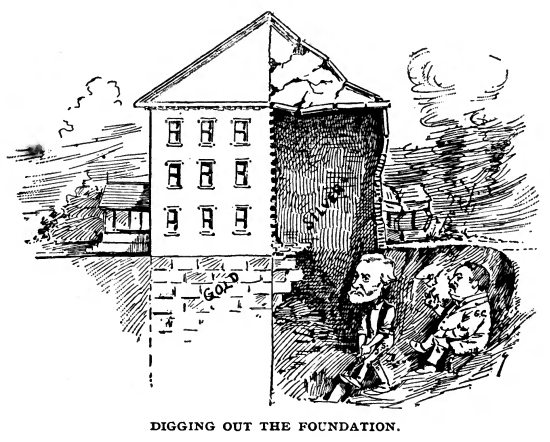
"If it is wished to vitiate the currency, increase the credit money beyond its normal quantity, or dig out the foundation from under it by lessening the supply of redemption money.
"The demonetization of silver destroyed one-half of the redemption money of the United States. It did it in this way: By making gold the unit and closing the mints to silver, it lessened the demand for silver, and its commercial value at once began to depreciate, as measured in gold.
"Where before silver and gold had been tied together as one mass of commodity money, and all property had measured its value in it, now gold became the only measure of value, and silver became credit money - token money.
"The moment a new standard of money was set up - only one-half in quantity to what had previously existed - silver began to fluctuate. It was then measured for its value in this new standard for measuring values, and bobbed up and down in the market, no longer possessing that fixed value which free coinage had given it. It was like a kite without a tail and its course was downward. It had changed its position from redemption money to token money.
"A forced parity between gold and silver has since been strained; namely, by sustaining silver with gold. It is the same kind of parity the government maintains between gold and paper money. What this means is, gold is our present redemption money and our credit money consists of silver and all forms of paper money.
"Each succeeding secretary of the treasury points to the law declaring it to be the intention of our financial system to maintain all our money at par. Gold is the most valuable of all our money, and therefore to maintain it all at par, gold must stand under it and do the work of redemption money.
"The law simply states an axiom in sound financiering. All of our money should be at par; with one kind of money just as good as any other kind of money.
"It is impossible to maintain two kinds of redemption money with one made from property having a commercial value of only one-half, or any noticeable per cent less than the other. When such is the case the lesser must lean on the greater, and to all intents and purposes becomes credit money, while the mere valuable becomes the only redemption money.
"We have in the United States in round figures $1,600,000,000 of all kinds of money. About one-third of it is gold, one-third silver and one third paper. One- third of our money is redemption money, and two-thirds is credit money.
"The blunder was made when silver was demonetized. The remedy is to remonetize it, and thereby restore its commercial value. Purchase acts, or any treatment of silver short of free coinage will have no beneficial effect."
Mr. D. H. Wheeler wanted to know of COIN if he did not believe it would advance prices if the government were to issue five hundred millions of greenbacks.
"No;" was the reply. "It would break down the present tottering financial system the sooner. The remedy to restore prices, is to remonetize silver, and then issue more greenbacks.
GENERAL PRINCIPLES
"We thus see that money, primarily, is a commodity - property - a thing of value possessing an exchange value with all other property.
"That credit money is a title to commodity money. That in the exchange value between commodity money and all other property, credit money does not add anything - it facilitates - makes convenient the transaction of business. Just as your wheat certificates add nothing to the exchange value of wheat, or the things for which wheat are exchanged; yet they facilitate its exchange.
"This commodity money is the measure of values. Its quantity becomes the measure, and each dollar is a part of that measure. Credit money adds nothing to its value, it only facilitates the transaction of business based on that measure of values.
"Our commodity or redemption money, up to 1873, was both silver and gold; and our credit money was paper and copper.
"Since 1873 our redemption money has been gold and our credit money has been paper, silver, nickel and copper. Silver and nickel have been added to copper as token money."
Here Mr. Walsh arose again, and COIN paused to hear the question he evidently intended to ask.
"Has not," asked Mr. Walsh, "the necessity for money diminished since checks, drafts and bills of exchange have come into such prominent use? The first use of money is to effect exchanges, and as a vast bulk of exchanges, are affected without money, should not this be deducted from the bulk of exchange before a normal amount of money can be considered?"
"That is a statement of common error," said COIN, "and others urge it with as much confidence as Mr. Walsh. That situation does lessen the amount of credit money employed; but it does not diminish the amount of redemption money necessary. Credit money is not used for its value, but for its convenience. Any other convenience which you can substitute for it may be made to answer the same purpose.
"As redemption money is our measure of values, nothing can take its place and assist it in its work that is not of equal commercial value.
"It is also an error to suppose that checks and drafts to any very great extent take the place of credit money. It facilitates business for a man to be able to carry his check book with him instead of the danger and inconvenience of carrying a large roll of bills; but the equivalent of each check he draws must be to his credit in bank to meet the check. If a man gives a check for $100, and that check is transferred to six different parties and pays in that way six different debts in the course of the day, it does no more than a $100 bill would have done. It, too, could have started on the rounds and paid the same number of debts. The check has no advantages over the bill in that respect.
"Where checks enlarge the use of credit money is in this: A bank may have had deposited with it $1,000,000. It only keeps say $400,000 on hand; the banking and check system give greater utility to the $1,000,000, but the necessity for actual money has not been decreased in the least - the expansion of credit money by substitutes only emphasizes its importance.
OUR FINANCIAL AND CREDIT SYSTEM
"Three lines of credits," continued COIN, "are built up on primary or redemption money.
"First: Credit money paper bills and all forms of token money all redeemable in primary money.
"Second: Checks, drafts, bills of exchange, and other forms of like paper, payable on demand.
"Third: Notes, bonds, accounts, and other forms of credit, payable at a particular day in the future, or upon the happening of some contingency.
"A reckless era of business that extends either or both the second and third lines of credit beyond their normal volume may create a panic. Notes, bonds and accounts become due that are not paid; a lack of confidence arises resulting in the demand for all debts due for fear delay will endanger their collection.
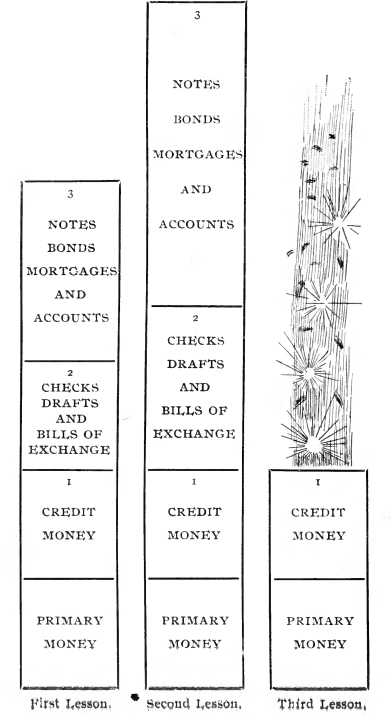
"A run on banks during such a period is natural, and many of them go down for want of sufficient reserve to pay all money deposited with them subject to check.
"I will illustrate it." As he said this he unrolled a chart, and as he proceeded he disclosed others, illustrating the relation of primary money to credits.
"The base section of these columns," he said, pointing with a stick at the illustrations, "represents commodity or property money. The next, or second, represents credit money. The third represents checks, and all forms of personal credits payable on demand. The fourth represents notes, bonds, mortgages, accounts, and all forms of debts calling for money, made when contracted payable in the future. Thus we have one - two - three - sections of credit built up on primary money.
"The column marked FIRST LESSON presents a normal or healthy condition of things - a proportion which it would not be safe to greatly alter.
"The column marked SECOND LESSON shows a proportion brought about by over-confidence. It is what often happens when the country is prosperous. A man in ordinary circumstances finds that he can easily float $5,000 dollars in debts; and as his business is prosperous, he increases it to $10,000. This expansion becomes contagious. Cities, counties, corporations - all increase their debts.
"The column marked THIRD LESSON shows the result this condition produces.
"In this instance which I have illustrated, the fault, or cause of the panic, has been entirely with the second and third columns of credit. Primary money and the first column - credit money - have not been at fault. Such panics are not of long duration.
"I now call your attention to the FOURTH LESSON, where the first, second and third sections of credit are all expanded beyond their proportion to primary money.
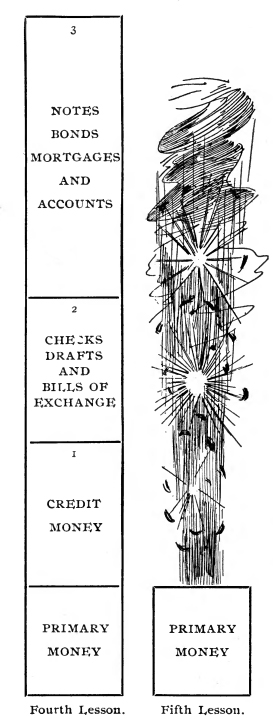
"The FIFTH LFSSON shows the result this produces.
"Panics thus caused are of longer duration, and more disastrous than the first. They breed distrust in the money of the country; and with those who do not distinguish between primary money and credit money, the prejudice raised goes to the whole financial system. When demonetization took place, the column representing primary money was reduced a small percentage over one-half - for convenience we will say one-half and this half that was demonetized was added to the first column of credits - credit money. The people, a short time before this was done, had been prosperous, and had expanded abnormally columns 2 and 3. So we then had conditions as illustrated in LESSON six.
"Though previously based on the declared intention to do so, actual resumption following the war, and a return to the system of property money, with credit money based thereon, did not take effect till January 1, 1879.
"For some time it was not generally known that silver was demonetized, and for many years since then its true position in our currency was disputed.
"It slowly dawned on the country that silver was neither fish nor fowl; that like Mahomed's coffin it swung half-way between the floor and ceiling.
"Finally the silver men, pushing their cause, forced the declaration from the administration that all paper money was redeemable in gold or silver at the option of the holder. This meant that they demanded the most favored and valuable of the two - gold. The government had stored most of the silver and issued paper money on it, which was declared to be redeemable in gold.
"This cut the base of the column half in two, and left us with only half a foundation for our financial system.

"This defined the position of silver as token money, and if not redeemed directly gold for silver the exchange of the silver for its paper representative would get the gold. The administration only wants a little more time to declare that silver is directly redeemable in gold the true position of token money.
"In the meantime, during these years, all property gradually declined in value compared with gold. The decline was painfully steady.
"These conditions caused new debts to be contracted to pay old debts, and the volume of new debts were rapidly augmented.
"Those who could make nothing in their business borrowed money on their property to go into new ventures, and to meet their living expenses. Old debts were refunded.
"Falling prices continued, and borrowing continued until the spring of 1893, when the 3rd column of credits had grown enormously. It had now reached the incredible sum of nearly forty thousand million dollars.
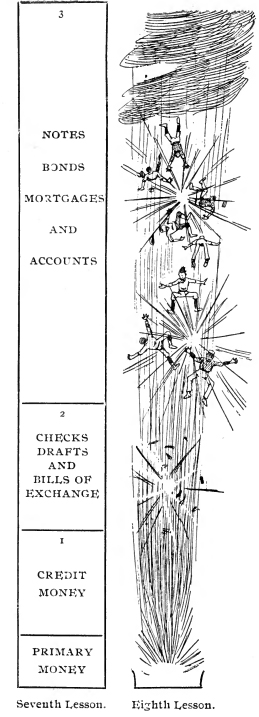
"The bonded indebtedness of the railroad alone was five thousand million. Every town and city nearly felt the weight of a debt. Farms were mortgaged. Property in the cities was nearly all mortgaged.
"LESSON SEVEN shows the condition with us in 1890, just before the Baring failure.
"LESSON EIGHT shows the panic as it began in 1890 the result of the portentous financial conditions that had been brewing for a long time. A financial storm was now on the country, the rigor and duration of which was to be unprecedented in the history of the world. For it not only involved the first, second, and third columns of credit, but primary money itself was involved under the enormous strain placed upon it.
"By 1893 the conditions had grown worse, and LESSON NINE will illustrate it. (Applause.)
"The best barometer of the storm now are prices of products and labor; the first is still falling, and labor is not one-half employed. Judged by these the storm is growing worse. LESSON TEN will illustrate the present financial condition of the country. (Applause.)
"What is now needed is first to build up the redemption money of the country. By putting silver back in the column of redemption money we could increase it from its present volume of six hundred million to twelve hundred million. This amount of redemption money would warrant twelve hundred million of credit money.
"This would give us twenty-four hundred millions of money on a sound financial footing, or about $34 per capita. Whereas we now have virtually less than $20 per capita on an insufficient and unsound basis."
As COIN made this last statement he laid his right hand on the silver bell on the table, and as its clear notes rang through the room, a signal that the school had adjourned for the day, a warm and hearty applause went up from a good percentage of the 2,500 people in the room.
